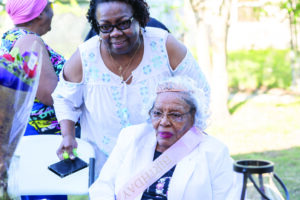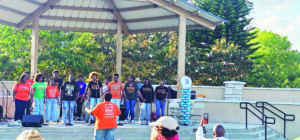Pioneering Black feminist Dorothy Pitman Hughes dies at 84

By ASSOCIATED PRESS
Dorothy Pitman Hughes, a pioneering Black feminist, child welfare advocate and lifelong community activist who toured the country speaking with Gloria Steinem in the 1970s and appears with her in one of the most iconic photos of the second-wave feminist movement, has died. She was 84.
Hughes died Dec. 1 in Tampa, Florida, at the home of her daughter and son-in-law, said Maurice Sconiers of the Sconiers Funeral Home in Columbus, Georgia. Her daughter, Delethia Ridley Malmsten, said the cause was old age.
Though they came to feminism from different places Hughes from community activism and Steinem from journalism the two forged a powerful speaking partnership in the early 1970s, touring the country at a time when feminism was seen as predominantly white and middle class, a divide dating back to the origins of the American women’s movement. Steinem credited Hughes with helping her become comfortable speaking in public.
In one of the most famous images of the era, taken in October 1971, the two raised their right arms in the Black Power salute. The photo is now in the National Portrait Gallery.
Hughes, her work always rooted in community activism, organized the first shelter for battered women in New York City and co-founded the New York City Agency for Child Development to broaden childcare services in the city. But she was perhaps best known for her work helping countless families through the community center she established on Manhattan’s West Side, offering day care, job training, advocacy training and more.
“She took families off the street and gave them jobs,” Malmsten, her daughter, told The Associated Press on Sunday, reflecting on what she felt was her mother’s most important work.
Steinem, too, paid tribute to Hughes’ community work. “My friend Dorothy Pitman Hughes ran a pioneering neighborhood childcare center on the west side of Manhattan,” Steinem said in an email. “We met in the seventies when I wrote about that childcare center, and we became speaking partners and lifetime friends. She will be missed, but if we keep telling her story, she will keep inspiring us all.”
Laura L. Lovett, whose biography of Hughes, “With Her Fist Raised,” came out last year, said in Ms. Magazine (of which Pitman was a co-founder along with Steinem) that Hughes “defined herself as a feminist, but rooted her feminism in her experience and in more fundamental needs for safety, food, shelter and child care.”
Born Dorothy Jean Ridley on Oct. 2, 1938, in Lumpkin, Georgia, Hughes committed herself to activism at an early age, according to an obituary written by her family. When she was 10, it said, her father was nearly beaten to death and left on the family’s doorstep. The family believed he was attacked by the Ku Klux Klan, and Hughes decided to dedicate herself to helping others through activism.








